Conversations with Abduhl: Where is Your God?
Scorching heat hit my face as we followed the adolescent driver out of the Marrakech Airport. We’d been warned not to rent a car in Morocco, so we’d asked the hotel to send a shuttle. In theory, it would take only 15 minutes to drive to our resort. As we made the humid trip across the black surface lot toward the van, I was already looking forward to a dip in the blue-tiled pool.
Without wasting a moment, we loaded up our gear and our family into the van. Alas, we hadn’t rolled more than 40 feet before encountering a snag: other drivers had parked smack dab in the middle of the exit lane. From where we now sat, we couldn’t move forward or backward. Our driver honked his horn, waved his hands, and shouted out the window in Arabic.
No one noticed our distress.
After five long minutes, a van behind us moved, creating a small opening on the diagonal. Our driver glanced at us, asking if we were game. We nodded a vigorous yes. He threw the van into reverse and backed up through the awkward opening; I held my breath until our bumper and nose had slipped through the tight spot. From there, the resourceful driver managed a series of unorthodox zig-zag patterns, moving forward and back, until finally he could lurch over a low concrete barrier to reach an adjacent parking lot.
One problem solved!
If you read the first part of this story, “Venturing into Morocco: a Warning Received in Prayer”, you know that I was forced to cancel our transportation plans at the last minute after a Moroccan outfitter attempted to cheat me. We still had an established itinerary of lodgings which I had created independently, but I was in dire need of a car and driver to carry us around the North African terrain during our week’s stay.
As it happened, the Muslim man who ended up filling this role was a Godsend. Despite our differences, and even our genders — a huge gap in the Muslim world — Abduhl and I connected as unlikely friends. In the time I would spend in the company of this humble man, I gained a new understanding of God from another religion’s perspective. The hard crust of my prejudice flaked off. I believe our meeting was divinely ordained.
THE UNFLAPPABLE MONSIEUR CHERIF
Our lucky charm who turned things around was the talented concierge at the Kenzi Manara Palace in Marrakech. Many locals here speak French as their foreign language, because Morocco was a pseudo-colony of France. Cherif has also mastered English with a distinguished British accent; he looked like a more dapper and carefree version of Barak Obama. (I guess being president ages one faster than being a concierge.) We would soon discover that Cherif could reach deep to pull rabbits out of his magic hat.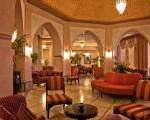
Not long after checking into the Kenzi Manara, we asked Cherif if he could possibly arrange someplace traditional for fine dining in a few hours time. Our resort was a world unto itself on the outskirts of town, where stucco holiday condos and gigantic hotels had seemingly sprung up from the desert, complete with large pools, mammoth buffets, and cocktail bars, to entertain the European tourists. Despite the glamorous setting, it felt a tad prefabricated. We preferred to venture into the old city to dine.
“Test me,” Cherif said, flashing a flawless smile. Handsome Cherif promised to have all the arrangements made when we arrived in the lobby, dressed for dinner, several hours later. Until then, he said, go and enjoy the pool. Relax!
That evening as we climbed into the van, I wondered, could we really trust these guys? It felt strange being driven by people you don’t know, whose language you don’t speak, through streets you don’t recognize. But one look at The Red House, a former palace-turned hotel with lush gardens, set me at ease. Geometric mosaics covered the walls and adorned the rows of columns placed around the candlelit room — something about the lay-out of the space made me feel like I was sitting inside a sheik’s tent.
Our waiter spoke English but sprinkled on enough French to make me feel linguistically fluent: “Oui, madame. Bon Appetit, madame. Je vous en prie, madame.” Wearing a Fez and a traditional robe, he was the epitome of polite servitude.
And he delivered a Moroccan feast: tender pigeon and ricotta cheese stuffed in flaky triangles of phyllo, followed by chicken, onions, and lentils cooked in a tagine with the ubiquitous spices of cumin and saffron, followed by grapefruit sorbet and sticky sweet date pastries. While we dined, an elderly man in a white robe and matching skull cap plucked high-pitched wailing songs. What was his odd instrument? It looked like a cross between a gourd and a guitar. Later I learned it was a lute. After several hours of mournful songs, the entertainment switched gears in a lively manner. 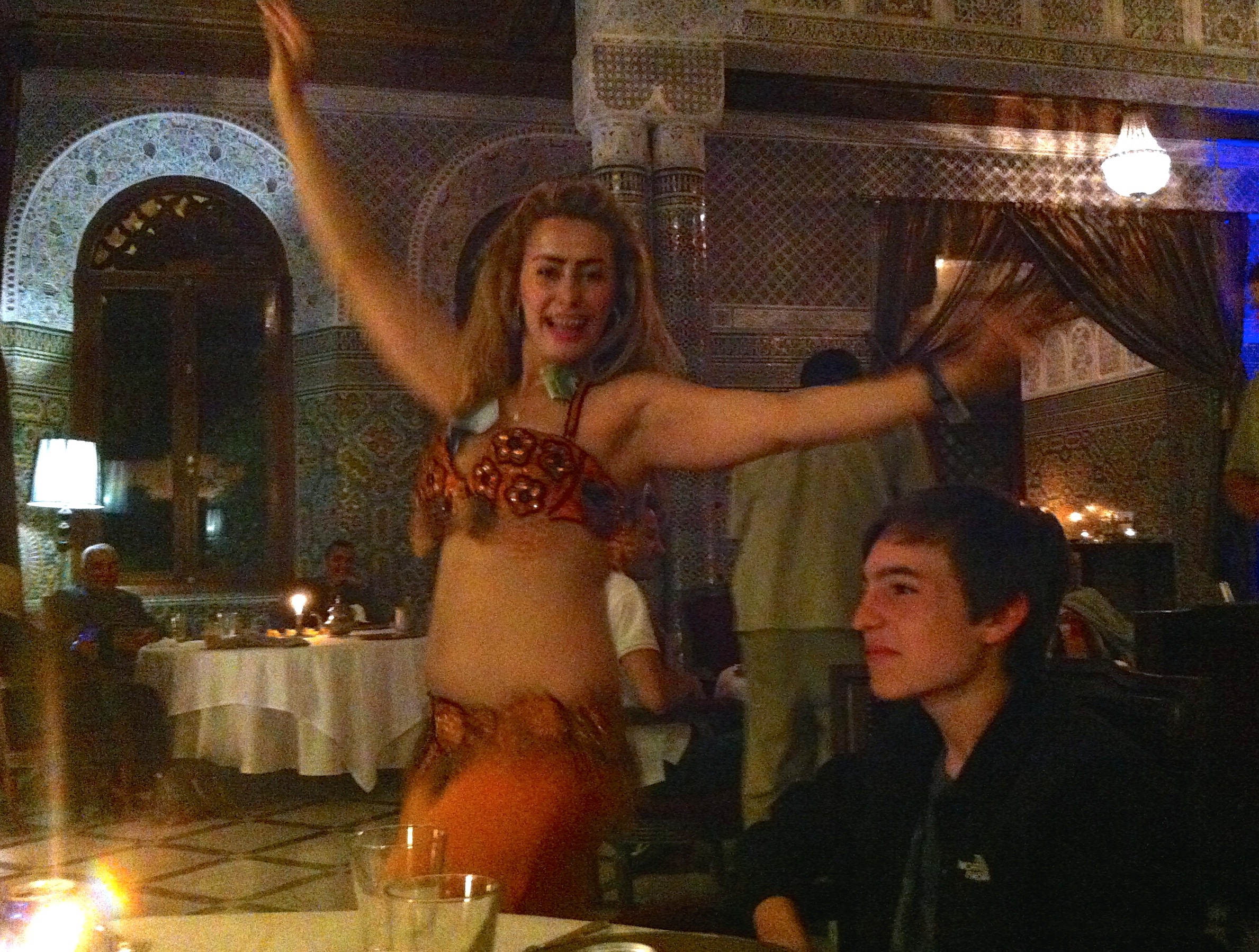 A whirling belly dancer came around to shake her hips and chest at every table. The apricot gauze of her skirts twirled as she swayed; the candles burned low, their warm light glistening against the highly-glazed tiles. I felt as if I had stepped back into the secret world of a harem.
A whirling belly dancer came around to shake her hips and chest at every table. The apricot gauze of her skirts twirled as she swayed; the candles burned low, their warm light glistening against the highly-glazed tiles. I felt as if I had stepped back into the secret world of a harem.
When she approached our table, the girl had paper money sticking out of the bustiere of her costume. Sam took out a 100 dirham note (about $10) and passed it over to Baker with a nod of his head toward the belly dancer. Baker wasn’t sure of the protocol for this situation. He tried putting the note in her hands, but she giggled and kept her arms raised above her head, forcing him to find another avenue. Baker’s face turned bright red as she shook her breasts. Finally, he plucked up his courage and gingerly tucked the rolled bill into the top of her skirt. She nodded her thanks and sashayed away.
OUR NEXT HOTEL IS OFF THE GOOGLE GRID
Cherif had proved his merit as a valiant concierge, so I explained our strange travel dilemma to him. In another day’s time, we needed someone reliable to drive us 90 minutes into the High Atlas Mountains. Even on Google, I could not locate an exact address for Douar Samra, the rustic guesthouse where we’d be spending two nights; the website basically said it was somewhere above a small village called Imlil where the road was nearly impassable and people relied on mules. Could Cherif help us sort out this puzzle?
Cherif shook his head and laughed, but once he saw I was serious, he set about it; he picked up the phone and worked his way through a hand-written ledger of contacts, speaking to one after another in lively Arabic. I paced in front of his desk as he scratched around for information. Would we ever find this place? I had sent emails asking for specific directions to the guesthouse, but I never received an answer. The website advised that not every room had electricity, so perhaps the internet was spotty.
Eventually, Cherif reached an acquaintance who lived near Imlil and worked as a freelance guide, taking tourists on rambles through the mountains. Yes, the guide knew Douar Samra. On Saturday, he would wait on the side of the only paved road leading into Imlil, and when we came by around noon, he would hop into the van and lead us the rest of the way. Now that we had someone who knew the path, all we needed was a car and driver.
“Leave it to me,” Cherif said, waving me away. “I’ll handle it.”
I trusted Cherif, yet I was a tad apprehensive about striking off into the backcountry with a Muslim stranger. Morocco is not radicalized, but after watching CNN’s daily coverage of Iraq and Syria, one can’t help but consider the possibility of various dark scenarios. I did not speak a word of Arabic or understand the nuances of Islam, but I could tell the difference between kindness and hostility. I decided I would attempt to read his expression and his body language upon meeting our driver.
When Cherif introduced us on the morning of our departure, I almost dreaded looking at the man’s face. What if he was like that aggressive pest selling leather slippers in the souk whose narrow eyes looked selfish and tricky? After arguing about the price, I ended up spending $20 just to make the annoying man go away. If our driver gave off that kind of vibe, would I still get in the car and go with him? I honestly did not know.
Yet as I searched Abduhl’s brown eyes, he looked back at me with genuine warmth and respect. His face was kind; his gaze was steady. He worked as a professional driver for a local tour company, and he spoke enough English to make things realistically feasible.
I felt relieved.
Before venturing into Morocco, I was secretly afraid of Islam. I hate to admit it, but since the Charlie Hebdo and kosher supermarket murders here in Paris this past January, I have felt personally threatened. Without meaning to, I would shrink back when passing a shrouded woman on the street. I was suspicious, on edge, afraid. I had never known any Muslims in a personal way, so the horrific brutalities toward Christians, Jews, and even Muslims of rival camps had become my lens for viewing Islam in the modern age.
Morocco is 90 percent Muslim, yet for centuries it has maintained strong ties to the western world; locals will proudly tell you that Jewish and Christian communities are allowed freedom of religion in Morocco. While that is true, the overriding culture centers around Islam. Most people cover their arms and legs, even in the summer heat, and most women cover 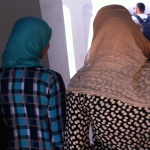 their heads (Actual veils are not required here. Many women hide their hair but still show their faces). Children start their training in the Koran almost as soon as they can toddle around.
their heads (Actual veils are not required here. Many women hide their hair but still show their faces). Children start their training in the Koran almost as soon as they can toddle around.
Friday is the holy day when families faithfully attend weekly worship, and non-Muslims are strictly prohibited from entering the sacred space. Despite being excluded from the mosque, tourists cannot escape the cultural overlay of Islam. The first call to prayer erupts around 5:30 a.m., projected over the rooftops by a loudspeaker from the minaret.
At first, the unfamiliar wailing sounds were disturbing. I knew the call included the phrase, “wake up, wake up, prayer is better than sleep,” but as I could not understand the words, the call (adhan) felt invasive and creepy. What if today, the muezzin was suggesting some kind of violence toward the foreigners in their beds? Of course this was paranoid thinking, and after a few days, I began to sleep through the early adhan.
Personally, I practice daily morning prayer as a Christian, and I admire the discipline of this Muslim tenant. I wasn’t surprised to learn that our driver, Abduhl, was a devout Muslim. Yet I was surprised to sense that Abduhl carried a personal holiness about him; his obvious devotion to God influenced his thoughts, words, and deeds.
“Do not call unclean what God has called clean,” had been the lectionary reading in the prayer room at the Marco Polo Airport on the day we flew to Morocco. (See part one of this story.) How should I apply such a teaching? What did it mean?
Near Imlil, the local guide was indeed waiting for us beside the road. He scrambled into the front seat next to the driver and spoke in rapid Arabic. I wished I could pick up even a vague sense of what he was saying; it sounded like he was angry, but his body seemed relaxed. All I could do was hope for the best. After we passed through the tiny village, the road became narrow and bumpy as it wound farther up the steep lane. Suddenly, our guide motioned for Abduhl to pull over. There was a cute hand-painted sign, pointing down a footpath, reading: Douar Samra.
We scrambled out of the van, and a local man appeared out of nowhere, leading a donkey. Within minutes, Jules the donkey had been loaded down with our suitcases; a specially-designed straw basket and a sturdy rope kept the luggage from tumbling. Led by his handler, Jules plodded over the edge of a hill. We had no choice but to follow on foot.
Although I was wearing flats, I kept skidding down some of the steeper slopes. We clambered after Jules for about five minutes as the narrow path cut between plain adobe houses with flat rooftops. When we reached the thick brown walls of Douar Samra, a Berber innkeeper with a flowered head scarf opened the gate. She smiled in greeting as she admitted us into an enchanting compound that felt like a cross between a rugged hut in the Andes Mountains and a hippie commune. Everything was colorful and cute: locally woven rugs with anti-evil eye patterns adorned the floor; bright throw pillows popped color on the low banquette of sofas; white-washed interior walls offered built-in alcoves for candles and lanterns.
It was instantly intimate and relaxing. We were a world away from the international party scene and seedy souks of Marrakech. 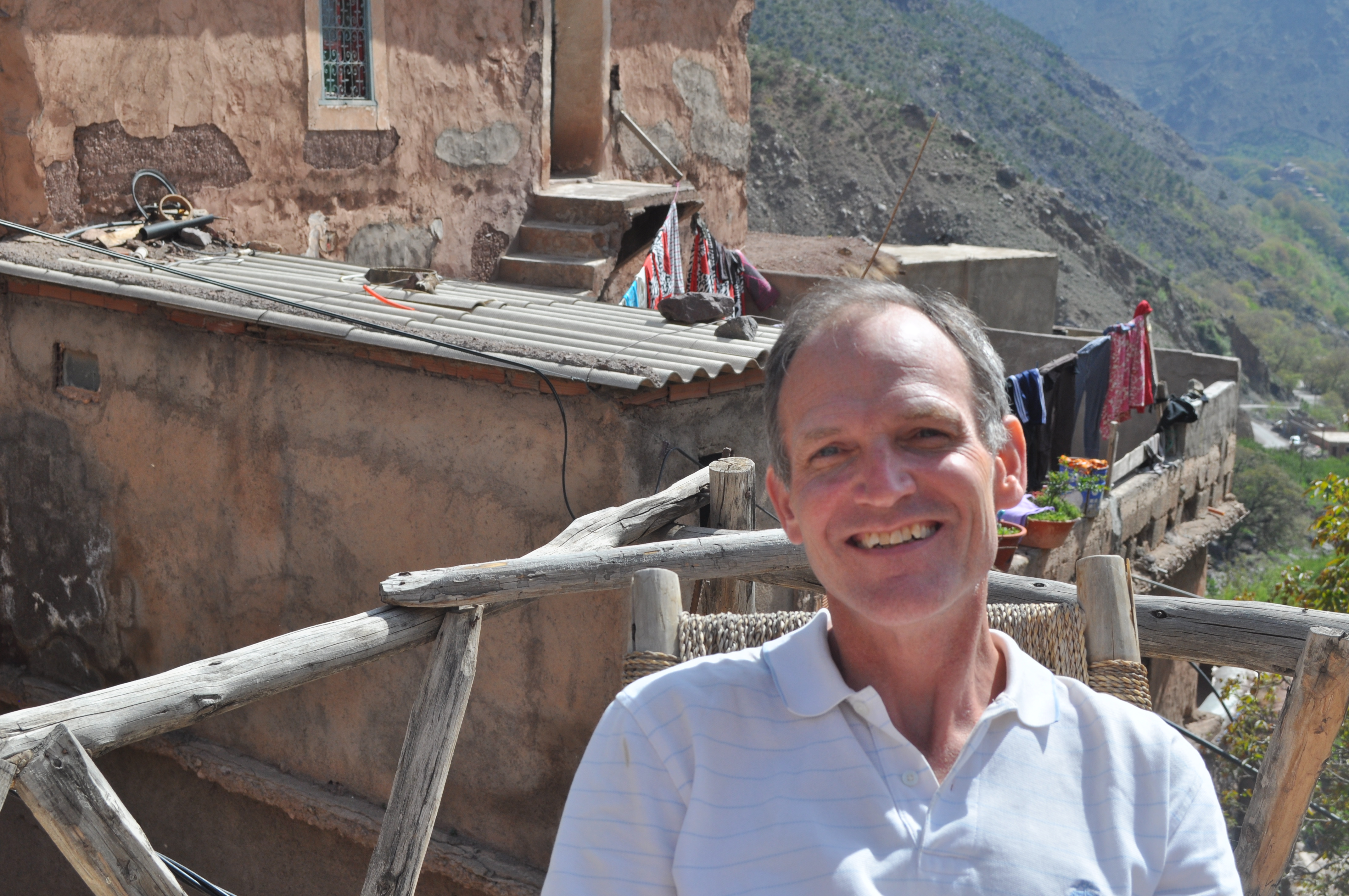 Our cabin had hard-packed floors, spruced up by the colorful sheep-wool carpets. A small toilet was hidden behind a simple cloth curtain. (All used toilet paper had to go into a lidded basket — it could not go into the toilet.)
Our cabin had hard-packed floors, spruced up by the colorful sheep-wool carpets. A small toilet was hidden behind a simple cloth curtain. (All used toilet paper had to go into a lidded basket — it could not go into the toilet.) 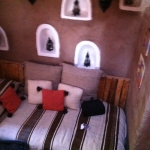 Four single beds filled the place, laid-out with a loft. Outside, the cabin had a flat roof and cushioned patio furniture where we could sit and absorb the surrounding view of the village: courtyards, chickens, children, washtubs, and donkeys of the neighboring homes. When the wind shifted, I could smell the soiled straw from the stables built at ground level under most of the houses. Beyond the clustered dwellings, the jagged tips of the High Atlas Mountains displayed their snowy peaks.
Four single beds filled the place, laid-out with a loft. Outside, the cabin had a flat roof and cushioned patio furniture where we could sit and absorb the surrounding view of the village: courtyards, chickens, children, washtubs, and donkeys of the neighboring homes. When the wind shifted, I could smell the soiled straw from the stables built at ground level under most of the houses. Beyond the clustered dwellings, the jagged tips of the High Atlas Mountains displayed their snowy peaks.
Our two days at Douar Samra were the highlight of Morocco. The meals were served family style: guests from a range of countries (Denmark, India, Australia, Switzerland, France and of course the U.S.) sat down together on the low banquettes. The serving man brought out baskets of bread, dishes of stewed chicken or beef, bowls of cooked lentils, platters of diced tomato and cucumber salad, and we passed the food around the table. Most people knew enough English to allow a flow of conversation. 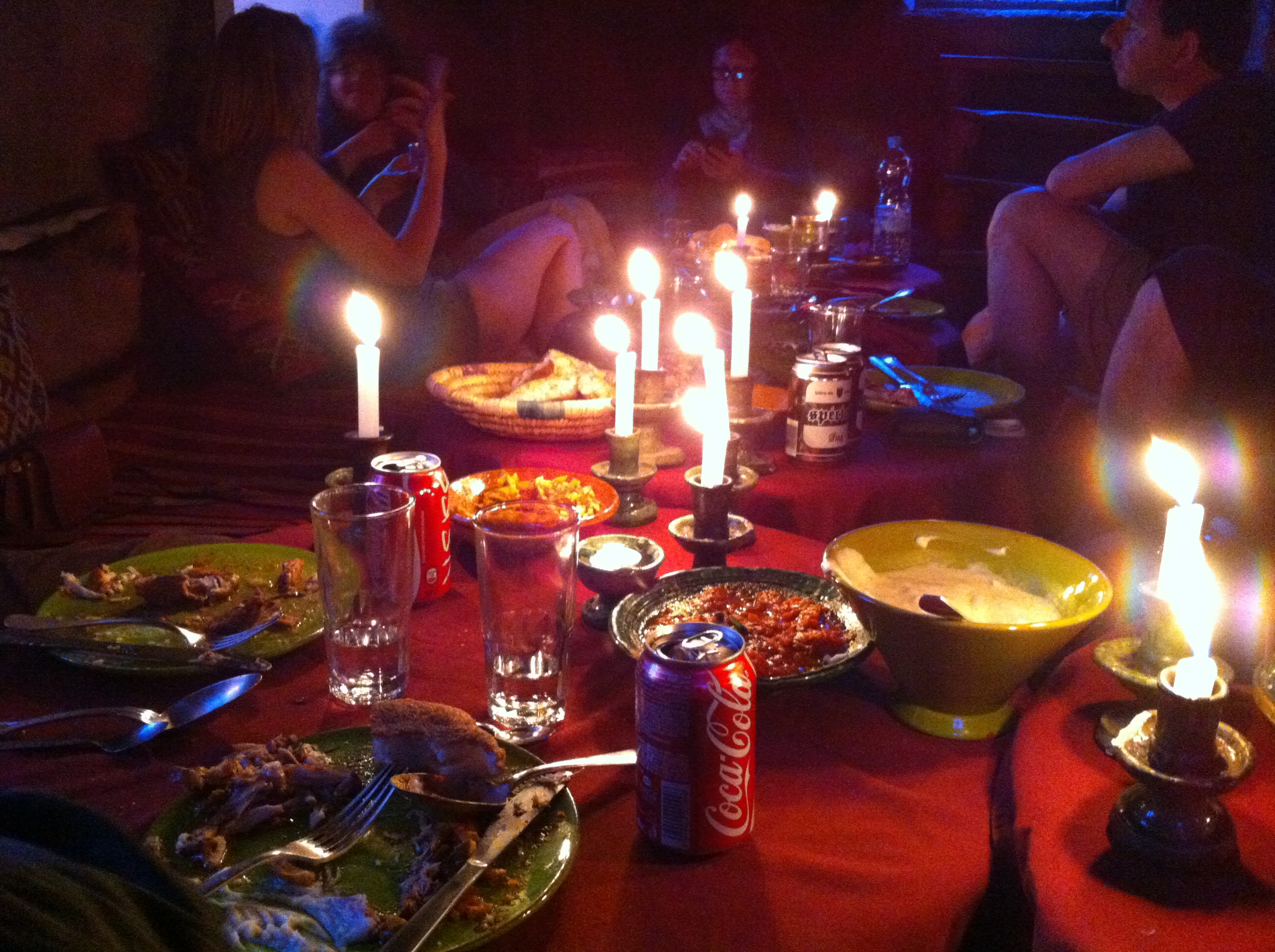 Over hot coffee at breakfast, I met Kay, a middle-aged woman who lives near London. Something about the way she spoke to the serving man tipped me off that she knew and respected him. Then she started talking about her Berber family — yet she was clearly British, not Berber.
Over hot coffee at breakfast, I met Kay, a middle-aged woman who lives near London. Something about the way she spoke to the serving man tipped me off that she knew and respected him. Then she started talking about her Berber family — yet she was clearly British, not Berber.
As we spoke, I discovered that Kay had been taken into the folds of a local family about 10 years earlier. She had come to the High Atlas as a tourist. As often happens, her guide invited her to visit his home after a day of trekking. The guides are hospitable, and they know that if you visit their home, drink the traditional hot and highly-sugared mint tea with their wife and daughters, you are more likely to tip generously. However, something special happened with Kay. She felt a true kinship to the guide, the guide’s wife, his sisters, his children, and she spent the rest of her vacation getting to know them.
Since then, she has come back to stay with them every three or four months, rocking babes to sleep, working in the kitchen to shell peas, making couscous on Fridays as part of the ritual of the Mosque day, and basically sharing in all the joys and trials of her adopted family. At first, Kay communicated with the family via French. Now she has learned to speak their own Berber.
Until a few years ago, there was no electricity, and the cycle of life was dictated by the sun. However, with electricity has come the appearance of satellite television. Kay’s family now gets more than 5,000 channels from around the world, with Arabic subtitles. Over dinner, they might stare at a doctor conducting an autopsy or catch a car chase in a cop drama. The villagers still rely on donkeys for daily transportation, and yet their sheltered lifestyle has been invaded by the outside world. I wondered how quickly their mindset and expectations would change. 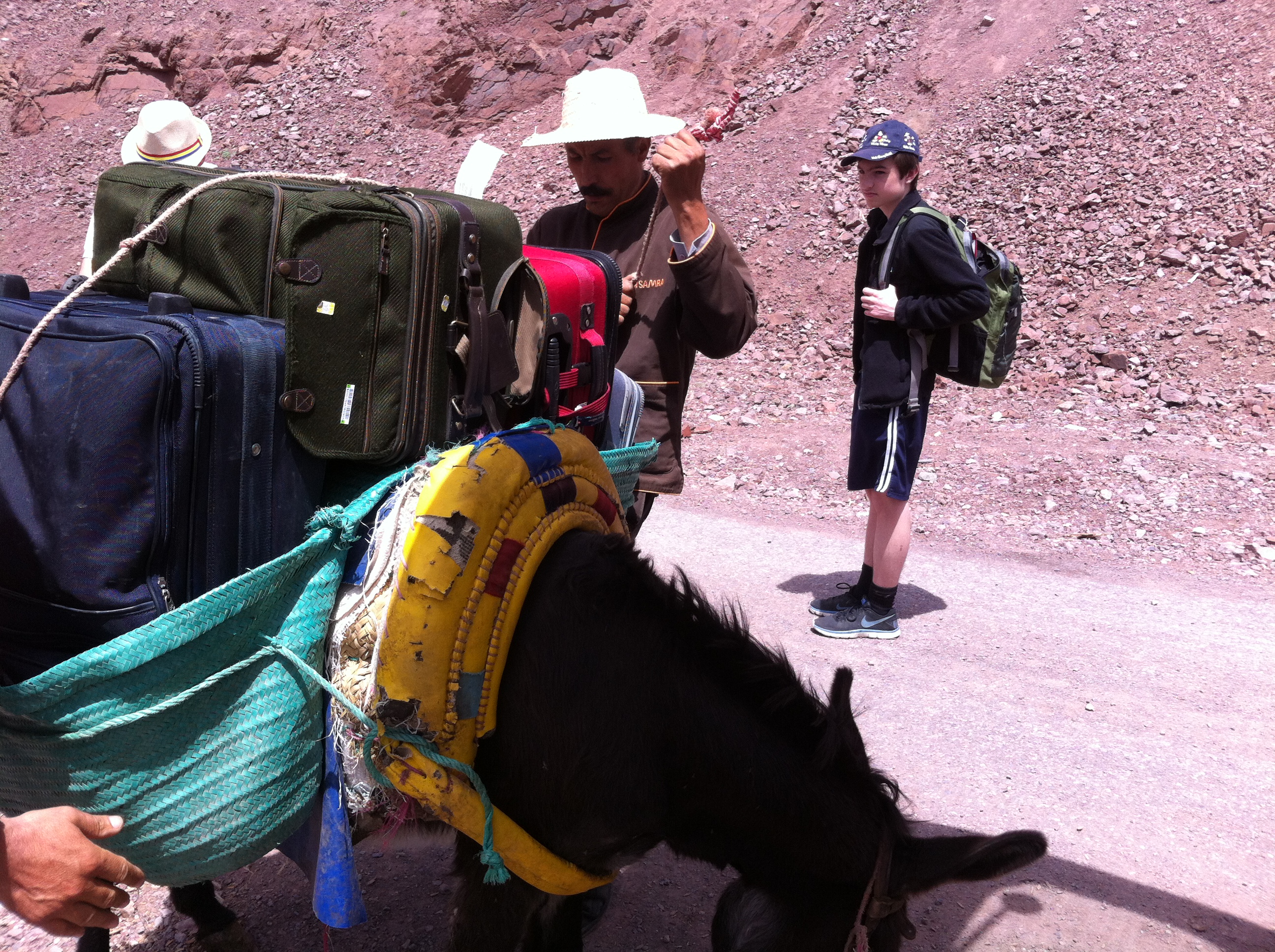 SHOULD WE TRY THE HAMMAM?
SHOULD WE TRY THE HAMMAM?
One afternoon after a long hike, we were invited to visit the hammam at Douar Samra. What’s a hammam? I’d heard it was some kind of an Arab steam bath. I wasn’t quite sure how it worked, but I was game to find out. The housekeeper told us to wear bathing suits and sandals. Bring shampoo and towels.
The hammam was like a slippery cave with candles set into the walls in alcoves. When I opened the glass door, moist steam hit me in the face. The floor was so hot that we had to stand on wobbly footstools to avoid burning our feet. There was a furnace underneath — fired by wood — that provided the hot water and made the steam. One huge metal tub held scorching water, and a second metal tub held cold water. We were given little buckets like a child might use at the beach to dip water from each vat and mix up the preferred temperature.
I like my water so hot it almost makes you shudder. We poured the vivid water over our bodies, then scrubbed down with black, gritty soap. The steam was so thick, it was like looking through fog. After getting covered with the black goop, we dumped buckets over our heads and rinsed. It didn’t matter that the water and soap were washing all over the floor; that’s how it was done. It was like reliving a child’s simple pleasure of splashing in the bathtub. The combination of the playfulness, along with the black scrub, the steam, the heat, and the water, was exhilarating.
We “hammamed” for about 30 minutes; afterwards I was so relaxed that my legs felt like noodles. All dried off, Sam and I stepped into these ridiculously comfy zip-up bathrobes made of fleece that made us look like a pair of green Telletubbies. Then we stumbled to the chaise lounges in the outdoor patio area and stretched out in the warm sun. I was completely content and could have lounged there for hours except that, all too soon, we were being called to dinner. 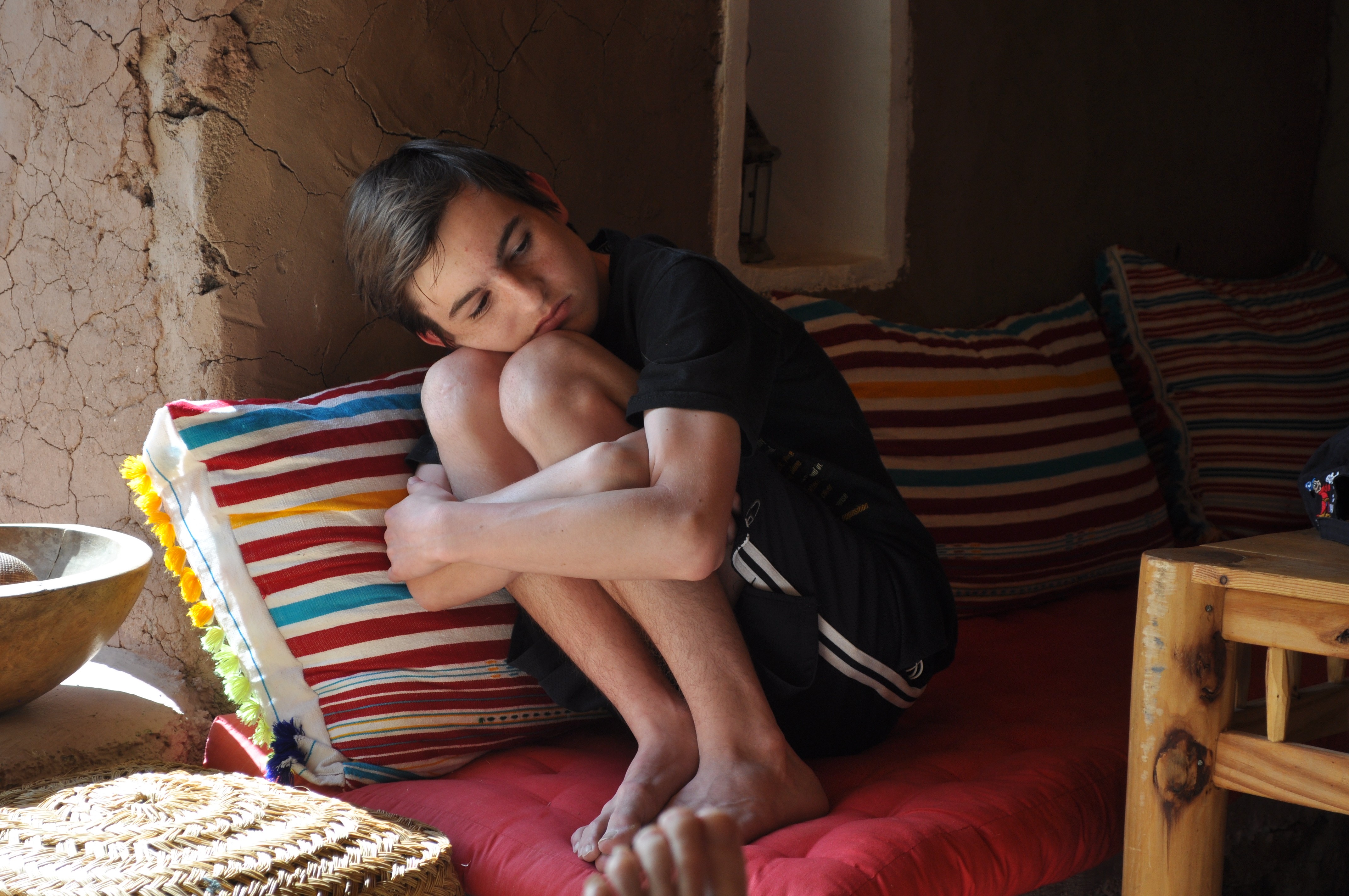 IS IT ALREADY TIME TO LEAVE?
IS IT ALREADY TIME TO LEAVE?
On Monday, Abduhl returned promptly at 10 a.m. to spirit us away from the mountains; we had a long day’s drive to reach the Atlantic coast. After winding along narrow ledges, the road eventually flattened to roll past dusty plains of grazing sheep. Unexpectedly, a police officer pulled us over on the far side of Marrakech.
Abduhl got out of the car and spoke to the officer. He ended up slipping him 100 dirham (about $10) to stop him from delaying us any further. Naturally, we reimbursed Abduhl. Don’t think of it as simply $10 – 100 dirham has the buying power in Morocco of about $25. The bribe would have been higher if the officer had been able to find any reason to justify adding on a fine. But Abduhl had his driver’s license; vehicle license and registration; professional license to drive tourists, among other papers. So we got away relatively lightly.
And the good news was, we were safe from this type of baksheesh for another 24 hours; Abduhl explained that police could not demand payment twice in the same day. Once again, I was thankful to have someone trustworthy who could help us understand how things worked in this strange new world.
WHERE IS OUR DRIVER?
Several hours later, we stopped for lunch at a sort of tent city/cinderblock kitchen displaying flags of Morocco, France, Italy, Romania, and the European Union. We were in the middle of nowhere, but surprisingly, several busses of tourists were parked out front. Near the cash register, a kiosk of key chains displayed flirty tassels, their pink, orange, and yellow fringe reminiscent of the belly dancer’s costume. Cheap-looking Oriental carpets hung on the walls.
It felt like an Arab truck stop with only one redeeming factor: it offered a women’s restroom with western-style toilets and a hijab-wearing attendant to keep things tidy. There is a broad range of bathroom options in Morocco, from the glamorous granite style in the resort hotels to the hole in the ground paved with a skirt of porcelain. The porcelain bases were usually wet, covered with dark footprints from the shoes of others who had ventured in before; those are not the kind of place to wear your sandals.
After we’d washed up, Abduhl ushered us to a table. “Please, please,” he said, gesturing for us to sit. I had expected him to join us, but he vanished. As we looked at the laminated menu of unappealing pizzas and paninis (maybe this was more like a glorified gas station), I felt slightly uncomfortable without our driver. Did Abduhl think he was supposed to keep himself separate from us?
Benton suggested perhaps the truck stop had a room in the back where the proprietors served free meat stew to the drivers, an incentive for them to bring tourists here. After we were almost finished trying to eat our meals, Abduhl reappeared. He was sitting alone at a table behind us, drinking a cup of coffee from one of those slender, finely decorated tea glasses that are ubiquitous in Morocco. When we made eye contact and nodded, Abduhl finished his coffee and came over to join us, kindly checking to make sure that everything was okay. Then he revealed that he had gone to a prayer room that was set aside upstairs. As proscribed in the Koran, he prays five times a day: early morning, around noon, later in the afternoon, early evening, and before bed.
It had never occurred to me that driving us might interfere with the rhythm of Abduhl’s daily worship. “We can stop and wait, whenever you need to pray,” I offered.
Abduhl shook his head and smiled. He would work around our schedule. As mentioned, we spoke in English. Abduhl is self-taught, learning from speaking with tourists and from studying books at home. As Abduhl explained about his daily prayers, I didn’t mentally reject it as being weird. For the first time, I started thinking about the positives of having a cultural norm that would turn people’s minds back to God throughout their day. Maybe that’s why I kept hearing the words “inshallah” from the locals. it means “if Allah wills it”. The Moroccans say this whenever they make a plan or express a wish, such as: “You will return to Morocco, and I will invite you to my home, inshallah.”
“IT’S THE SAME! IT’S THE SAME!”
The next day in the car, I was surprised that Abduhl wanted to talk about our views on religion. Abduhl knew we were Christian; he told us that most Muslims dispute that Christ is divine in part because they scoff at the notion of God having sex with Mary to create a son. But Abduhl said that God would not need to have sex with Mary — he could create Jesus simply by the power of his word. “It is nothing for him to do this,” Abduhl said.
I was stunned at his willingness to accept this idea. Abduhl also told us that his mosque leaders would read teachings from Jesus as well as the Prophet. When the Iman would read this teaching, the men would show their respect by replying, “peace be with Jesus” or “peace be with the Prophet”. Before long, we realized that as I am a student of the Bible, and he is a student of the Koran, many of our ideas about God and the order of the cosmos were in agreement.
Abduhl was delighted, like a wonder-struck child, to hear confirmation from me that so many of our religious stories are similar: Noah’s Ark, Jacob’s Ladder, King David, King Solomon, for example.
“It’s the same! It’s the same!” Abduhl proclaimed happily.
How can there be any question of the authentic connection that we each feel with our creator? We discussed the horrors of the ISIS, and we both agreed that this group was serving the devil. “How can you say Allah Akbar while killing someone God has made?” Abduhl said. “This is not Islam.”
We talked while he was driving at a high speed down a two-lane highway. In his excitement, Abdhul kept looking into the rear view mirror in order to see me, as I was sitting in the back seat. I could only pray that God would protect us from a head-on collision: inshallah.
Then Abduhl’s voice grew serious as he presented an important question. “Let me ask you this,” he said. “Please tell me. Where is your God?”
How can I answer that? I wondered. I collected my thoughts, then I spoke from my heart: “God is all around us, in all parts of the world, yet also, he is within us,” I explained. “When I sit and pray, he comes to me.”
“It is the same!” Abduhl practically shouted with joy. “It is the same. God is in everything, and he is in here.” He pointed toward his heart. 
The privacy of the van gave us the freedom to discuss our thoughts freely, to our mutual joy.
PULLED OVER AGAIN
Twice more, on different days, the police stopped us. Working in pairs, they looked imposing in desert-colored military uniforms — white gloves, knee breeches, boxy hats – the formal outfits reminded me of something a South American dictator might wear.
During the third and final time stop, the questioning officer was only about 20 years old, and he had the recklessly aggressive demeanor of someone trying to cover up for inexperience with belligerence. Adbuhl handed him a stack of papers, and the young officer was staring intently at what appeared to be a license to drive tourists. It seemed he was trying to find a reason to impose a fine.
In Arabic mixed with French, the conversation sounded like this to me: “Blah-ava, blah-ava Avril 14 blah-ava blah,” the police officer said.
Abduhl shook his head, pointed at the paper and said, “Blah-ava, blah-ava Juin 13 blah-ava blah.” Part of the appeal of Morocco is the exotic Arab culture overlaid with a whitewash of French language, customs, and governmental functions. For instance, you might see a school using the name “ecole”. Here, Abduhl and his adversary were using the month and date from the French calendar system. I inferred that the police officer was accusing Abduhl of driving with an expired license. Abduhl was defending his position, pointing at the printed date. Could this young officer even read?
With aggressive strides, the officer marched over to his senior partner, who was busy trapping another passing vehicle with stiff motions of his arm. The young officer stuck Abduhl’s license under his senior partner’s gaze. They had a short discussion. Then, shoulders drooping, the junior officer returned and handed the papers back to Abduhl without a word. The older officer waved at us dismissively. They were letting us go! Without missing a beat, Abduhl put our car back on the highway before they could change their minds.
BEING FEMALE FEELS DIFFERENT HERE
A few days later, we sadly parted ways with Abduhl in El Jadida. We were staying at a friend’s villa near the end of our trip, and we no longer needed a car and driver. This was the only time we ventured out amongst the locals on our own, and it was the only time we encountered any trouble.
El Jadida is not a particularly pretty place, therefore, it doesn’t attract swarms of foreigners. In Marrakech, I saw European women wearing shorts at the tourist sites, and no one bothered them about it. Even so, I kept myself in pants. Better to be conservative.
In El Jadida, it was steamy hot, so I decided to wear a frumpy and old-fashioned dress. The hem hit just below my knees, and the matronly style was like something June Cleaver would have worn on Leave It to Beaver. Our French friend who owns the villa had assured me that it was fine to wear a dress in El Jadida.
But as we walked toward the beach, I noticed that people, especially women, were glaring. Everyone else wore jeans or ankle-length skirts. I had covered my neck area with a scarf, my head with a cap, and my arms with a cardigan sweater. The only skin showing was on my lower legs and ankles. By western standards, I was modestly attired. But the scornful stares practically shouted that I was breaking the rules.
I detested feeling like a spectacle. The half-mile walk to the beach was unpleasant; besides the hostility, I was surprised that the sidewalks were cracked and broken in places, and that food wrappers, empty cans, and rotting vegetal material littered the street. At last we reached a breezy promenade overlooking the dark sand and gentle ocean. A group of boys played European football down in the sand, and people along the promenade stopped to watch the casual game. Vendors had set up temporary stalls, selling cooked snails, henna tattoos, mass-produced candies, and straw beach mats.
We were the only foreigners. Often, I prefer it that way, because it gives one a chance to truly see how the locals live and, in this case, spend their free time on a Friday afternoon. Yet, as we wandered along the Esplanade, a tall teenage boy drove his shoulder into me, shoving me roughly. I was so surprised that I stopped, turned around, and threw him an accusing glare. “What the heck?” my look implied.
A younger boy, about 13, was walking beside him. This kid looked surprised as well, and he nervously glanced back and forth between the more reckless teen and me. The kid whispered something and nudged the older boy; “not a good idea, Omar,” he seemed to be saying. The older teen stared at me, weighing his options. Should he apologize? Should he push me again? After a moment’s uncertainty, he shrugged, laughed awkwardly, and simply walked away.
The moment of tension passed. Immediately, my husband and sons criticized me for having reacted at all; the situation could have escalated, Sam said. Then what would we have done?
Yet it was a primal reaction; I felt upset, picked on, and instinctively I demonstrated my shock. That wouldn’t happen in a civilized country, I thought. Imagine my surprise when The New York Times recently reported that Muslim women who wear head scarves in France sometimes receive the same type of abuse — getting shoved by passersby, being called ugly names, or even being banned from public events such as a town festival at a local park. Apparently, many of the French feel resentful and frightened of the Muslims in their midst. About eight percent of the population here is Muslim, mostly immigrants from North Africa or the Middle East. The French are resolutely secular in their government and in their society, and they do not appreciate the religious baggage that these immigrants are unpacking here.
It’s not like these new arrivals are chameleons eager to change colors to blend into the fabric of French life; they want to recreate and spread their religious culture here. The mindsets don’t blend easily, and all too quickly, the dissonance can create a cross-cultural anxiety. The xenophobic political party, The National Front, is growing in popularity. Arab-owned kabob stands and corner stores have been torched.
Hate breeds reciprocal hate. As confessed, I felt the dark seedlings of prejudice taking root in my soul, but I justified it by thinking of the bloody atrocities carried out in the name of Islam. As Abduhl said, that is not Islam. When he said it, I knew it was true, at least, true for him. And I sensed that we were indeed worshipping the same God. Yet I know the Lord Jesus, and I honestly believe Christ is cornerstone of any relationship with God. So how can this be?
Perhaps God’s mercy is wider than our understanding. C.S. Lewis explores this precept in the closing scenes of The Last Battle. The Christ-figure (the lion Aslan) surprises everyone by embracing a fallen warrior from amongst his enemies, the fierce people of the Crescent who worshipped of the demon Tash. This moving exert is told from the warrior’s perspective:
“Then I fell at his feet and thought, Surely this is the hour of death, for the Lion (who is worthy of all honour) will know that I have served Tash all my days and not him. Nevertheless, it is better to see the Lion and die than to be Tisroc of the world and live and not to have seen him. But the Glorious One bent down his golden head and touched my forehead with his tongue and said, Son, thou art welcome. But I said, Alas Lord, I am no son of thine but the servant of Tash. He answered, Child, all the service thou hast done to Tash, I account as service done to me. Then by reasons of my great desire for wisdom and understanding, I overcame my fear and questioned the Glorious One and said, Lord, is it then true, as the Ape said, that thou and Tash are one? The Lion growled so that the earth shook (but his wrath was not against me) and said, It is false. Not because he and I are one, but because we are opposites, I take to me the services which thou hast done to him. For I and he are of such different kinds that no service which is vile can be done to me, and none which is not vile can be done to him. Therefore if any man swear by Tash and keep his oath for the oath’s sake, it is by me that he has truly sworn, though he know it not, and it is I who reward him. And if any man do a cruelty in my name, then, though he says the name Aslan, it is Tash whom he serves and by Tash his deed is accepted. Dost thou understand, Child? I said, Lord, though knowest how much I understand. But I said also (for the truth constrained me), Yet I have been seeking Tash all my days. Beloved, said the Glorious One, unless thy desire had been for me thou wouldst not have sought so long and so truly. For all find what they truly seek.” ― C.S. Lewis, The Last Battle
In the Old Testament, God promises the Hebrews in Jer. 29:13: “You will seek me and find me, when you seek me with all your heart.”
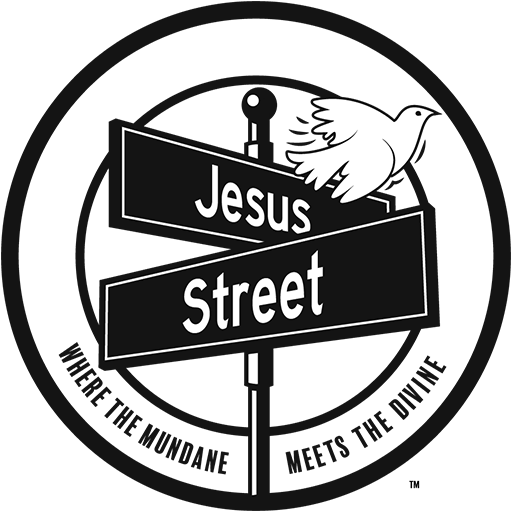
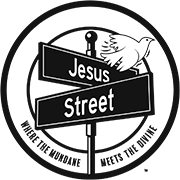
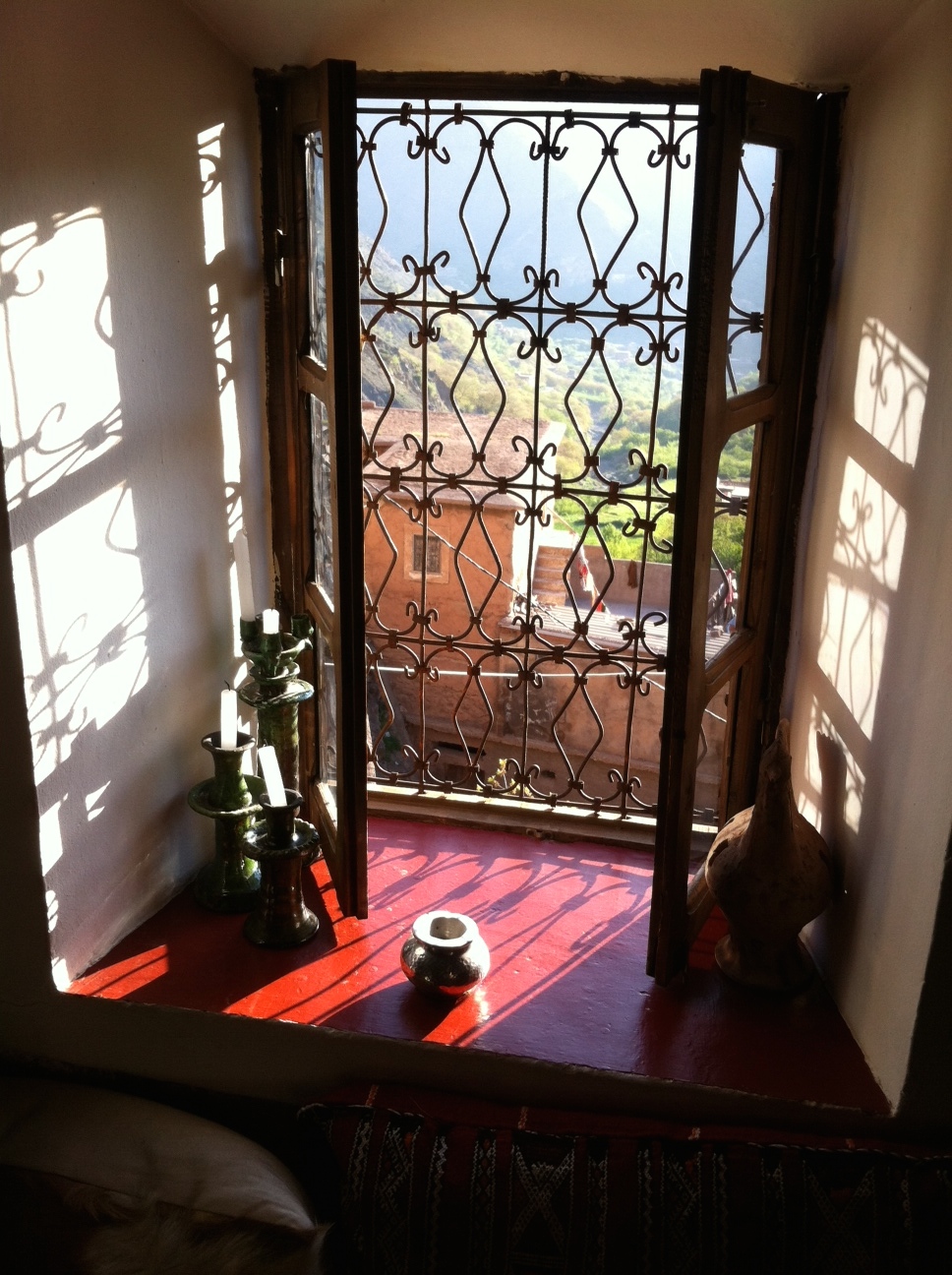
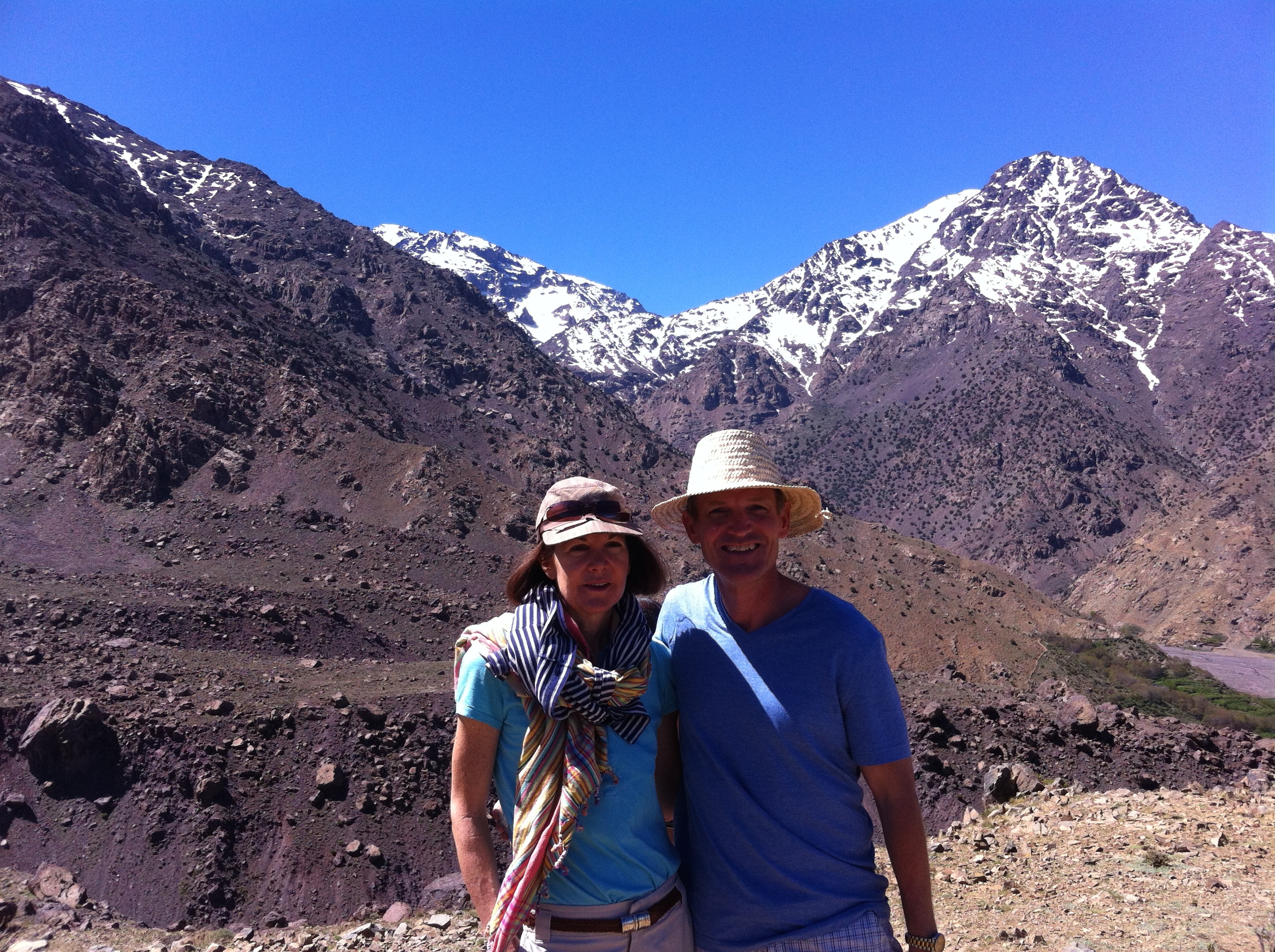

3 Comments
Wow- what adventures you are having! Your writing is terrific and informative with such colorful descriptions and language.
Another great addition to your adventures. I am amazed and impressed that you all even contemplated this excursion. Good for you, and thank for reporting.
Mary Lucy: thank you for reading the Morocco stories and for your comments. It is always so nice to hear from you and to know that you are cheering us on.
Pringle